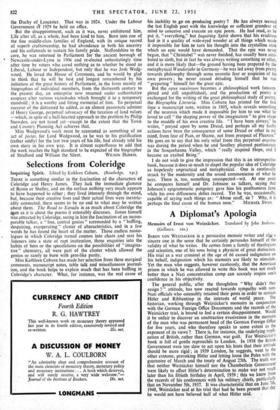Selections from Coleridge
Inquiring Spirit. Edited by Kathleen Coburn. (Routledge. 25s.)
THERE is something similar in the fascination of the characters of Coleridge and Henry James. They lack the immediate glamour of Byron or Shelley, and on the surface nothing very much appears to have happened to either ; they lived intensely through the mind, but, because their creative lives and their actual lives were inextric- ably connected, there seems to be no end to what may be written about them. The Road to Xanadu is as much about Coleridge the man as it is about the poems it ostensibly discusses. James himself was attracted by Coleridge, seeing in him the fascination of an incom- parable talker, a " fine, central genius " surrounded by a " baffling, despairing, exasperating " cluster of characteristics, and in a few words he has found the heart of the matter. Those endless mono- . logues in which Coleridge turned cosmos into chaos and sent his listeners into a state of rapt inattention, those enquiries into the habits of bees or the speculations on the possibilities of " imagina- tive " chemistry, all were part of the cluster, which allowed the genius so rarely to burn with gem-like purity.
Miss Kathleen Coburn has made her selection from these marginal comments, manuscript notes, table talk and miscellaneous journal- ism, and the book helps to explain much that has been baffling in Coleridge's character. What, for instance, was the real cause of his inability to go on producing poetry ? He has always seemed the last English poet with the knowledge or sufficient grandeur of mind to conceive and execute an epic poem. He had read, as he
put it, " everything," but Inquiring Spirit shows that his erudition had in it a quality of wide-eyed wonder at all things which made
it impossible for him to turn his thought into the crystalline state which an epic would have demanded. That the epic was never begun, that " Christabel " wa's never finished, has usually been attri- buted to sloth, but in fact he was always writing something or other,
and it is more likely that—the ground having been prepared by the metaphysical Wanderjahr in Germany—he was led away from poetry
towards philosophy through some neurotic fear or suspicion of his own powers ; he never ceased deluding himself that he was " preparing " himself for the great epic.
But the opus maximum becomes a philosophical work (uncom- pleted and still unpublished), and the production of poetry is exchanged for the writing of the great philosophical study of poetry, the Biographia Literaria. Miss Coburn has printed for the first tirpe a manuscript note, written in 1805, which reveals something of the neurosis which made it impossible for him to use what he loved to call " the shaping power of the imagination " to give shape to the muddle of his own creative life. " I have been always," he writes, " preyed upon by some Dread, and perhaps all my faulty actions have been the consequence of some Dread or other in my mind, from fear of Pain, or Shame, not from prospect of Pleasure." He goes on to say that his only relief from this perpetual angoisse was during the period when he and Southey planned pantisocracy in the Susquehanna -Valley, which " really inspired Hope, and I became an exalted Being."
I do not wish to give the impression that this is an introspective book, because it does so much to dispel the popular idea of Coleridge as hopelessly unpractical and metaphysical. One is continually struck by The modernity and the sound commonsense of what he says. There is, too, something unsuspected—wit. At one point he compares himself and Dr. Johnson as talkers, saying that Johnson's epigrammatic pungency gave him his posthumous fame while his own diffuseness defies record. Yet he was, occasionally, capable of saying such things as: " Abuse snuff, sir ? Why, it is
perhaps the final cause of the human nose." MICHAEL SWAN.


















































 Previous page
Previous page